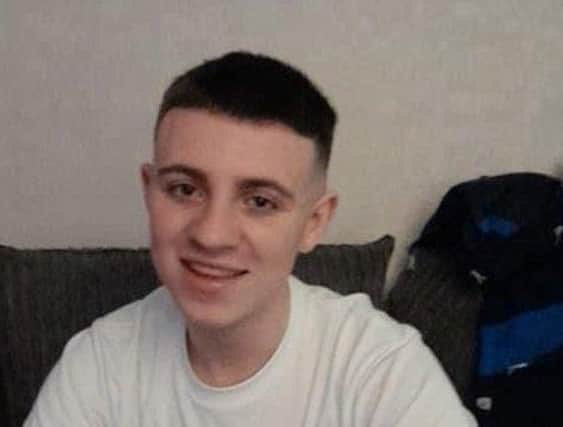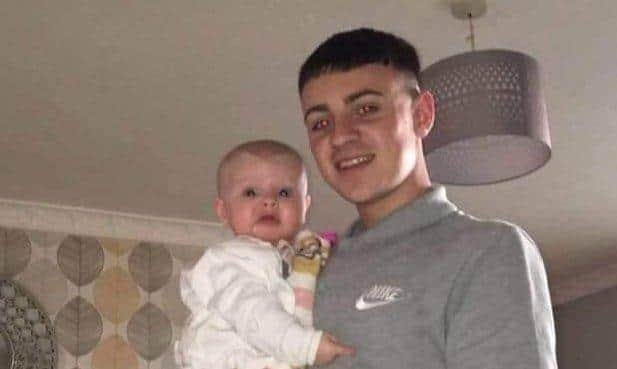‘We want to make people aware of epilepsy and the risk of sudden death’


Peter O’Hagan and his dad John had signed up to do a charity challenge in aid of Epilepsy Action this month, however they never got to complete it as Peter sadly died in May.
His family and friends will now take on the challenge in Peter’s memory.
Advertisement
Hide AdAdvertisement
Hide AdThe Shantallow man passed away as a result of sudden unexpected death in epilepsy, something that is rare and affects one in every 1,000 adults with epilepsy each year.


The teenager was diagnosed with epilepsy in December 2019 when he was just 17 and it had a huge impact on his life and his family.
Epilepsy affects around 600,000 people in the UK and approximately 1 in 100 people in the UK have epilepsy.
Around 87 people are diagnosed with epilepsy in the UK every day.
Advertisement
Hide AdAdvertisement
Hide AdPeter’s aunt, Margaret Doherty, said that he was ‘a loveable wee boy’ who ‘just loved socialising’.
“The epilepsy had a big impact on his social life and his work life.
“He was training to be a joiner, but that had to be put on hold for health and safety reasons, because he couldn’t use the machinery as a result of his seizures.
“Peter, like anyone when they turn 17, wanted to learn to drive.
Advertisement
Hide AdAdvertisement
Hide Ad“His granda had even promised to get him ten lessons, just to get him going. But after he was diagnosed with epilepsy he just wasn’t allowed behind the wheel.”
Margaret explained that Peter was diagnosed with epilepsy just days before Christmas 2019 after having a seizure.
“He was admitted to hospital and they did a couple of brain scans and blood tests,” she said.
“Thankfully he got out of hospital on Christmas Eve, because we all wanted him home for Christmas to be with his family.
Advertisement
Hide AdAdvertisement
Hide Ad“Peter was given medication and a few leaflets about living with epilepsy, but he was never able to get his seizures under control.”
Margaret said Peter’s diagnosis and regular seizures were ‘very difficult for the family to come to terms with’.
“It was really devatasting for him to get the diagnosis when he was a teenager because all he wanted was a normal life.
“His mum, Orla, has epilepsy, but she would have absences rather than full on seizures and we were never told that it was genetic.
Advertisement
Hide AdAdvertisement
Hide Ad“My brother John (Peter’s dad) had to search the internet for advice on how to give first aid to someone having seizures.
“Initially they would phone for an ambulance when Peter took one. But unless he was in a seizure for a certain length of time, the family had to just learn how to deal with them.”
The father of one had spoken to his epilepsy nurse the day before he died about potentially increasing the dose of his medication to try to control his seizures.
“They were just happening too often,” Margaret said. “He had a seizure after talking to the nurse and afterwards he was always really tired. He went to bed that evening and Orla and John checked on him and he said he was fine.
Advertisement
Hide AdAdvertisement
Hide Ad“He was due to talk to Craft Training the following day as he was hoping to change courses and train to become a plasterer. But he never woke up and he was found dead the following morning.”
Margaret said the family were unaware of sudden unexpected death in epilepsy.
“Our grief is still very raw but we want to make people aware of epilepsy, the different types there are and the fact that there is a risk of sudden death in epilepsy.
“We were never aware of it as a family and if we can share our story to raise awareness it might help others, especially other teenagers like Peter. They find it hard to talk to their parents at the best of times and if they are diagnosed with a medical condition, they need to tell people how they are feeling, try to get as much help as they can and push for regular review appointments.”
Advertisement
Hide AdAdvertisement
Hide AdMargaret said that Peter, who was the only boy in his family, ‘was always just so happy’.
She added: “He has a huge smile on his face in every photo and he loved to socialise. He was really popular and seemed to know everyone.
“Peter loved to dance and loved music, he even tried his hand at DJing.
“He was just such a loveable wee boy, happy and full of life.”
Advertisement
Hide AdAdvertisement
Hide AdThe 18-year-old sadly never got to celebrate his daughter Ayda’s first birthday, which fell the week after he passed away.
“He had been planning to have a party for her that weekend. He had her cake and presents bought, but he never got to celebrate it with her.”
Peter’s family and friends are doing the sponsored walk in aid of the British Epilepsy Association on July 24.
“We want to mark the fact that Peter and his dad John had planned to do it themselves, but never got the chance.
Advertisement
Hide AdAdvertisement
Hide Ad“We now want to do it in Peter’s memory to raise awareness of epilepsy,” Margaret said.
“We also want to raise much needed funds for research, especially into sudden death in epilepsy. It is something that we never thought we would have to deal with. We just never thought it would happen.”
Margaret said that everyone is welcome to join them on the walk and ask that anyone who wants to get involved adheres to all the social distancing guidelines.
The walk will begin at 1pm from Sainsbury’s on July 24.
To donate to the fundraiser visit: https://uk.gofundme.com/f/walk-for-peter